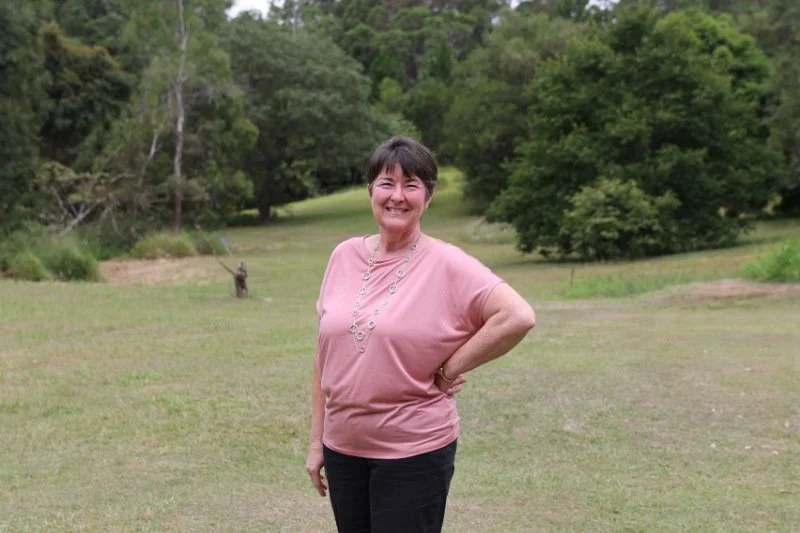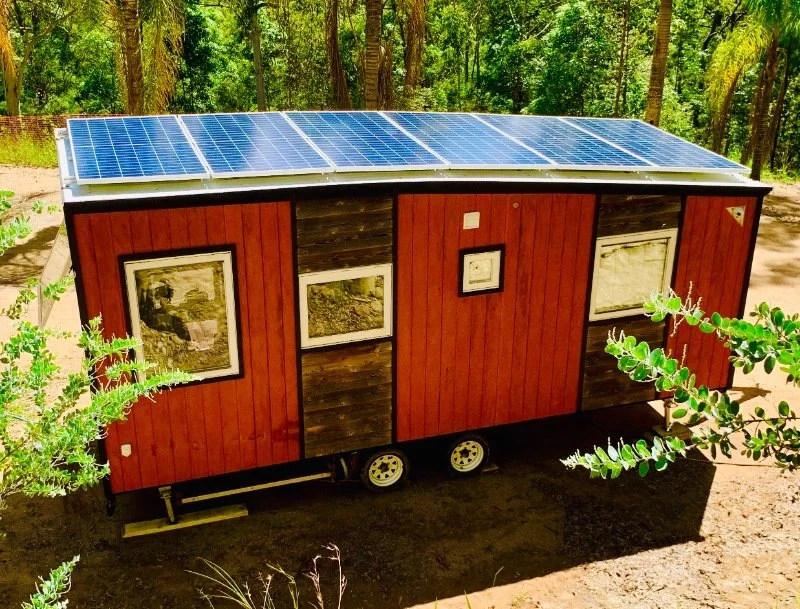Call for relaxation of temporary housing laws in light of crisis
Helen Andrew, on her property at West Woombye, has plenty of room for affordable accommodation. She says Council needs to relax the rules on temporary housing to alleviate the housing crisis.’
The housing crisis on the Sunshine Coast does not look like it will improve any time soon. Under the circumstances, Woombye resident Helen Andrew says its wrong that many residents who are having to resort to affordable accommodation like caravans and tiny homes remain at risk of eviction by the Council.
A tiny home.
The Sunshine Coast’s subordinate local law ‘Establishment or Occupation of a Temporary Home’ currently restricts the time frame to park to no more than four weeks in a 52-week period without a permit. A permit costs $514.
While Council staff do not actively pursue those breaking this law, they will act on it if they receive a complaint.
This happened to Ms Andrew when she and her husband Ron allowed Western Australia resident Darlene to park her caravan on their land. Darlene had not been able to return to WA during border closures in 2020.
“A neighbour complained to the Council, they got in touch, and ultimately, Darlene was given the notice to vacate,” she said.
“We were shocked and disgusted. We asked for compassion, given the circumstances, but it didn’t make a difference.
“Unless this law is changed or suspended, no one living in caravans, buses or tiny homes has any security or certainty.”
The situation prompted Helen to spearhead a campaign to suspend this local law until the new town plan is implemented.
“A short email from people can help provide more security for people choosing different permanent housing options,” she said.
“I sent a very personal email to (Council CEO) Emma (Thomas) and received a cut-and-paste, tick-and-flick reply explaining the local law with instructions on how to apply for a permit, which costs $514,” Ms Andrew said.
“This reply did not address my concerns, and I will ask for a response that addresses my concerns as a landowner who wants to help people during this housing crisis.”
Ms Andrew also hopes the new town plan recognises that these housing solutions are no longer viable temporary housing options but permanent housing choices.
Tiny home advocate from Polkadot Community Inc, Jimmy Hirst, said suspending this law would enable the many local people living on a knife’s edge to enjoy stability and breathe a sigh of relief.
“It also allows the region to create a housing model which supports more affordable living and enables our significant elderly and retiring population to age in place. It also leads to better outcomes which improve mental health, connection and wellness, and lead to a more meaningful way of life.
“Land sharing and sharing goods in small communities is a significant win-win for residents and local regions alike with economic, environmental and social benefits,” he said.
“I’d be proud to see the Sunshine Coast Council showing leadership in genuinely taking care of the needs of its citizens like so many other councils in Australia are doing.”
“The entire state of NSW has taken action to respond to clear and urgent community needs to relax the rules on temporary housing to alleviate the brutality of escalating property values until better solutions can be found, so it’s time for Queensland and the Sunshine Coast to catch up.”
How to help
If you would like to support the Suspend the Local Law campaign, email Emma Thomas, the CEO of Sunshine Coast Council, requesting that she suspend the Establishment or Occupation of a Temporary Home local law. To contact Ms Thomas go to the form at www.sunshinecoast.qld.gov.au/Council/Contact-Council/Contact-the-CEO. For more information and resources, visit www.regensunshinecoast.au.
Response from Council …
Replying to Ms Andrew, see article above, Sunshine Coast Council says it appreciates that the recent rapid increases in the cost of owning or renting a home on the Sunshine Coast has been causing some people to consider moving into temporary accommodation to remain on the Coast.
It says the current local law for a temporary home allows for a person to set up temporary accommodation on a property for up to four weeks without an approval and, depending on the type of temporary home proposed, allows approval to be obtained for the placement of a temporary home on a property for up to 18 months. By requiring approval to be obtained, Council says it is able to appropriately manage any amenity and health issues that might arise with a temporary home. Council looks particularly at such matters as the location and placement of the temporary home and the management of waste and grey water produced.
Recent changes have been applied to the Planning Regulation 2017 to remove the requirement for the occupant(s) of a secondary dwelling to be a part of the household occupying the primary dwelling on the property. Council says this change has the potential to make more accommodation options available.


